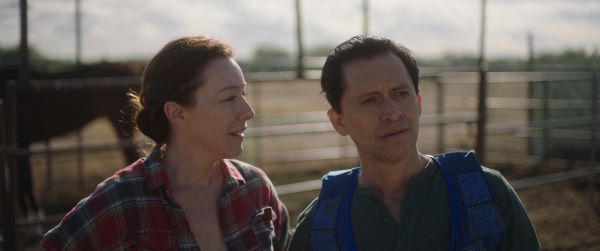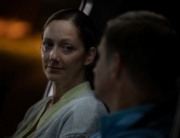Jockey is the perfect encapsulation of the Roger Ebert quote, “It’s not what a movie is about, it’s how it’s about it.”
It doesn’t tell a particularly unique story. The main character, Jackson Silver, is a jockey with a few good years left in him, but his body is giving out on him, and he is trying to hide it from his longtime horse trainer, Ruth Wilkes (Molly Parker), with whom there is some serious unexplored romantic energy. Two things drop into his life in quick order. A young jockey (Moises Arias) comes to his home claiming to be his son, and a young horse is bought by Ruth that Jackson immediately recognizes is a champion. Will he win it all with this new horse named Dido’s Lament? Or will his body collapse? You can very well guess the answers without having seen the film. But you should see it because it is a quiet, observant, and sympathetic character study with a standout performance by the always reliable Clifton Collins Jr.
What makes Jockey work so much better than other sports movies is that it is less interested in the sport than the ramifications of committing to it, emotionally and physically. Characters are constantly listing the injuries they have received in their career (some of the actors are actually jockeys, and there is no reason to believe their dialogue is scripted). Jockeys receive very little of the purse of a victory. Jackson lives in a trailer on the grounds of the racetrack, and he is a one of the better-known riders. Some have kids to feed, but nobody is buying a McMansion in the suburbs off their winnings.
Even though viewers get a lot of information quickly in the film’s first quarter, the rest is spooled out as if director Clint Bentley was the world’s most patient fisherman. This allows us to marinate in Jackson’s world, where it is apparently almost always dusk or the break of dawn. Jockey has so many magic hour shots it could be mistaken for Days of Heaven. But this underscores why these characters stay and live in this world. Bentley films it as a place of reverence and beauty. Horses are frequently filmed with the camera tilted up toward them, as if they were gods.
Then there is Collins’s performance. Within his wiry frame, there is an exterior sense of quiet stateliness hiding a potent intensity underneath. Collins, one of our great character actors, steps easily into the spotlight, disappearing effortlessly into the taciturn Jackson. He has able support from Parker and Arias.
Eventually all of Jackson’s issues, personal and physical, swirl together as one would expect. Here is where Bentley does not throw a curve so much as a sinker. All the forward momentum moves toward the trajectory one sees in films like The Wrestler or The Champ, but Bentley allows his character some growth, and by the end, what we get is not tragedy so much as acceptance and the freedom that can bring.
Jockey is a worthy addition to a year laden with very good movies.

















Leave A Comment